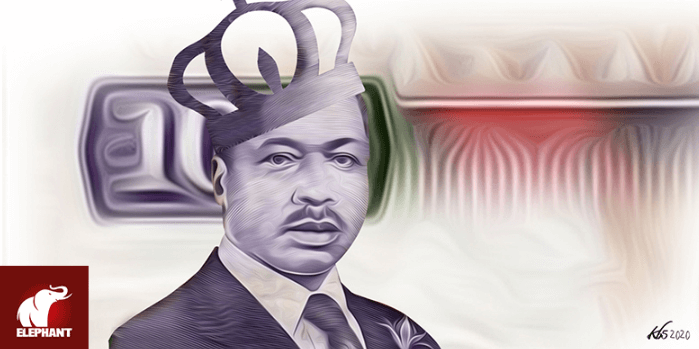Discover how Jomo Kenyatta Caused Discontent During His Rule In Kenya By

Jomo Kenyatta’s presidency in Kenya, spanning from 1963 to his death in 1978, was marked by both progress and discontent. While he is celebrated as the founding father of the nation and a key figure in the fight for independence from British colonial rule, many Kenyans also view him as a controversial leader who caused widespread discontent during his rule.
One key factor that contributed to discontent during Jomo Kenyatta’s reign was his centralization of power. As president, he sought to consolidate authority within his own office and limit dissenting voices within government and society at large. This led to accusations of authoritarianism and stifling of political opposition, leading many citizens to feel disenfranchised.
Additionally, corruption and nepotism were rampant under Kenyatta’s regime, further eroding public trust and breeding resentment towards those in power. These issues were compounded by economic policies that disproportionately benefited the wealthy elite while leaving many ordinary Kenyans struggling to make ends meet.
As we delve deeper into Kenyatta’s legacy, it becomes clear that there were multiple reasons why his rule was met with mixed reactions from those he governed over during this time period.
Overview of Jomo Kenyatta’s Presidency
During Jomo Kenyatta’s presidency in Kenya, his leadership style and policies gave rise to various forms of discontent among the population.
While he is celebrated for leading Kenya to independence, challenges during his rule included ethnic tensions, corruption, and political repression.
His government favored certain tribes while marginalizing others, which created resentment and division within the country.
Additionally, his administration was accused of suppressing dissent through censorship and imprisonment of political opponents.
Despite these challenges, Kenyatta made notable achievements such as expanding education opportunities and promoting economic growth.
However, his legacy remains controversial due to the negative impacts of his policies on certain groups in society.
Centralization of Power
The centralization of power in the government had significant implications for the distribution and allocation of resources in Kenya during Jomo Kenyatta’s rule.
The concentration of power within Kenyatta’s inner circle led to the marginalization of certain ethnic groups and regions, exacerbating existing tensions between communities.
Critics argued that this centralization was a deliberate attempt to consolidate power and suppress opposition.
The opposition party, KANU, was largely controlled by Kenyatta and his close associates, further limiting political dissent.
This concentration of power also hindered economic development as decisions were made without proper consultation or consideration for diverse perspectives.
Overall, the centralization of power under Kenyatta’s presidency contributed to discontent among certain groups who felt marginalized by the government’s policies and actions.
Corruption and Nepotism
Corruption and nepotism have been persistent issues in the Kenyan government, with reports of embezzlement and favoritism becoming commonplace. For instance, in 2019, a report by Kenya’s Ethics and Anti-Corruption Commission found that over $78 million had been stolen from the National Youth Service through fraudulent tenders and fake invoices.
The impact on democracy is significant as it erodes public trust and undermines the legitimacy of elected officials. Corruption diverts resources away from public services, perpetuating poverty and inequality.
Moreover, nepotism reinforces a culture of impunity where those in power can act with impunity without fear of consequences. This ultimately leads to a lack of accountability and transparency, further fueling discontent among citizens who demand more accountable governance.
It is imperative for the government to prioritize measures to combat corruption and nepotism if it seeks to regain public trust and ensure a sustainable democratic future for Kenya.
See also Using A Pedometer Can Promote A Physically Active Lifestyle
Economic Policies
Economic policies in Kenya have been a topic of debate as they heavily impact the country’s socio-economic development and public welfare.
During Jomo Kenyatta’s rule, economic reforms were implemented to improve the nation’s economy, but they also created discontent among the citizens.
The government encouraged foreign investments to boost the economy, which resulted in large multinational corporations exploiting natural resources while locals remained impoverished.
Additionally, policies that favored wealthy elites and politically connected individuals worsened inequality and stalled progress towards equitable economic growth.
These factors contributed to growing resentment towards Kenyatta’s administration among ordinary people who saw little benefit from his economic policies.
See also Trips Krista Mayne Travel Agent Luxury Travel For Less With Emphasis Of Travel To From Utah
Political Repression
Political repression in Kenya has been like a dark cloud hovering over the country, stifling dissent and denying citizens their basic rights.
Under Jomo Kenyatta’s rule, political opponents were often detained without trial and the government actively suppressed freedom of speech and assembly.
This resulted in a climate of fear where citizens were afraid to speak out against the government for fear of being persecuted.
Human rights abuses were widespread, with reports of torture and extrajudicial killings being common.
Today, although some progress has been made towards improving human rights conditions in Kenya, there are still concerns about political repression and violations of civil liberties.
The legacy of Jomo Kenyatta’s regime still lingers on, as many Kenyans continue to fight for greater freedom and democracy in their country.
Ethnic Tensions
Ethnic tensions remain a significant source of concern in Kenya, and have been fueled by a range of factors including land disputes and tribalism.
The issue of land ownership has long been a contentious one, with various ethnic groups laying claim to the same territories. This has led to frequent conflicts and even violence between communities, further exacerbating underlying tensions.
Similarly, tribalism remains a potent force in Kenyan politics, with political leaders often seeking to mobilize support along ethnic lines rather than pursuing policies that benefit all citizens equally.
Land Disputes
Land disputes in Kenya were a significant source of discontent during Jomo Kenyatta’s rule, as the government’s policies favored wealthy elites and often led to displacement and marginalization of rural communities.
The colonial legacy of unequal land ownership meant that large portions of fertile land were owned by European settlers or wealthy Kenyans, leaving many rural communities with limited access to resources.
During Kenyatta’s tenure, the government implemented policies that aimed to promote agricultural development but often resulted in forced evictions and land grabs by powerful individuals.
Additionally, the government’s failure to address historical injustices around land ownership contributed to ongoing tensions and conflicts between different ethnic groups.
These issues continue to impact Kenya today, as marginalized communities struggle for their right to secure tenure and fair compensation for lost lands.
Tribalism
In contemporary Kenya, there remains a high prevalence of tribalism which has been linked to social and economic inequalities. For instance, a survey conducted by the Ipsos research firm in 2020 found that 80% of Kenyans believe that tribalism is a major problem in the country, with over 50% reporting experiencing some form of discrimination based on their ethnicity.
Addressing prejudices is essential for ethnic integration and promoting unity among citizens from different tribes. Effective measures such as affirmative action policies in employment and education can be implemented to reduce disparities and promote inclusivity.
Additionally, creating platforms where individuals from different tribes can interact and engage in meaningful discussions can also help break down barriers and reduce negative stereotypes associated with certain ethnic groups.
While it may take time to fully eradicate tribalism, addressing these issues through deliberate efforts towards inclusivity will ultimately promote cohesion and positively impact the socio-economic development of Kenya.
Legacy and Impact of Kenyatta’s Rule
The lasting effects of Jomo Kenyatta’s rule in Kenya continue to be felt today, as his policies and actions have had a significant impact on the country’s political, social, and economic landscape.
While he is credited with leading Kenya to independence from British colonial rule in 1963, his legacy has been marred by allegations of corruption and authoritarianism.
Kenyatta’s emphasis on consolidating power within his own ethnic group, the Kikuyu, led to marginalization and discrimination against other groups, exacerbating existing tensions and fueling tribalism.
His approach also limited opportunities for democratic participation and hindered social justice initiatives that could have addressed issues such as land reform and inequality.
Despite these criticisms, Kenyatta remains a revered figure among many Kenyans for his role in achieving independence, but his mixed legacy serves as a reminder of the complex challenges faced by postcolonial nations seeking to build inclusive societies.
Conclusion
Jomo Kenyatta served as the first president of Kenya from 1964 until his death in 1978. His presidency was marked by a centralization of power, corruption and nepotism, economic policies that favored the wealthy, political repression, and ethnic tensions.
During his rule, Kenyatta concentrated power in the hands of a few individuals while suppressing dissenting voices. The government became increasingly corrupt and nepotistic, with members of Kenyatta’s family benefiting greatly from their positions of power.
Economic policies focused on expanding the agricultural sector and attracting foreign investment but did little to benefit ordinary citizens. Kenyatta’s regime also engaged in political repression through restrictions on freedom of speech and assembly. Ethnic tensions were exacerbated by unequal distribution of resources among different groups.
Despite these challenges, Kenya experienced significant economic growth during Kenyatta’s presidency. One interesting statistic is that under Kenyatta’s leadership, GDP grew at an average rate of 5% per year. However, this growth was not evenly distributed across society and did little to alleviate poverty or address underlying social inequalities.
In conclusion, Jomo Kenyatta’s presidency was characterized by centralized power structures that promoted corruption and nepotism while failing to address important social issues such as poverty and ethnic tension. While there were some economic gains during his tenure as president, these benefits were not shared equally across society. This legacy has had lasting effects on Kenya’s political landscape today.




